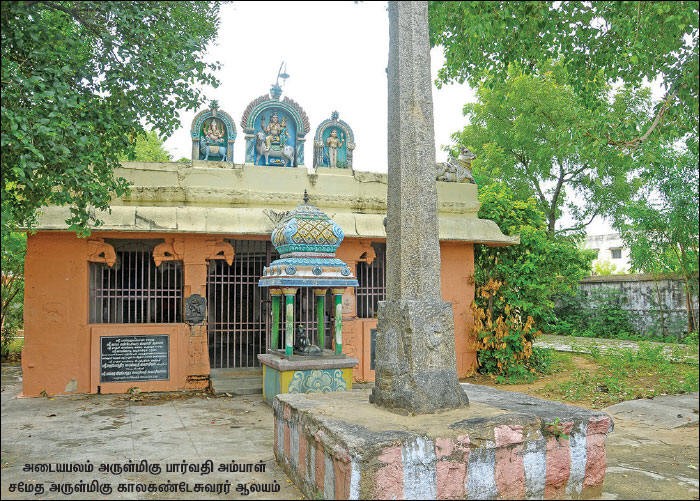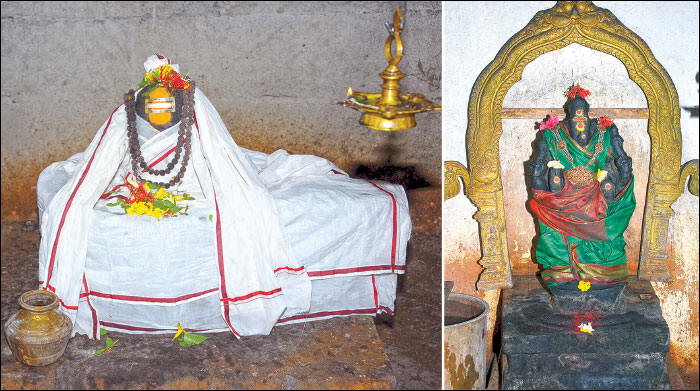Posted Date : 06:00 (09/10/2018) October 9, 2018 Sakthi Vikatan
திருவருள் செல்வர்கள்! - 13 - ஸ்ரீஅப்பய்ய தீட்சிதர்
StaretsyDivineGrace – 13 – SrīAppayya Dīkṣithar
Author: P.N. Parasuraman, The Wordsmith With Golden Tongue.
Murali K
The foursome made of King Chinnabomman, Tanjore king, Appayya Dīkṣithar and a Vidvān went to the temple Darśan. 1
An idol of a village deity had its adamantine index finger resting on its nose. Asked about the reason, the answer coming from the temple official was, “A Mahāṉ will reveal the secret of the idol, and the Sāsthā (the deity) will move his finger from his nose.” The kings looking at Srīdīkṣithar and the Vidvān asked, “Can anyone of you reveal the idol’s secret?” The Vidvān came forward and said, “Sāsthā’s Vigraha (idol) is thinking since he is the son of Mahavishnu, equal to Brahma, he regrets his misfortune of associating with Siva’s Bhūta Gaṇas (attendants).” 2
That explanation by the Vidvān did not move the finger of the idol off its nose. All the assembled people begged Srīdīkṣithar to offer an explanation. 3
Srīdīkṣithar: “When I go to Kailas, I call Parvati, ‘Amma’ (Mother). What would I call Lakshmi Devi, the wife of my mother Mahavishnu in the form of Mohini?” That is what the idol is thinking. That was the explanation given by Appayya Dīkṣithar. 4
Explanation: The idol is the son of Parvati and Siva. Mahavishnu is the brother of Parvati. Mahavishnu in a quixotic turn of events morphed into Mohini, a luscious woman and a mediatrix between the gods and the demons in the partition of Amṛta or the nectar of immortality. Siva fell in love with Mohini (his brother-in-law, now a woman). The son of Siva is confused and flabbergasted wondering what he would call Lakshmi, the real wife of Mahavishnu.

That very moment, the finger of the idol came off the nose and went down. All the assembled people praised Srīdīkṣithar, paid homage and received Dīkṣithar's blessings. Dīkṣithar’s fame and name spread. Likewise, the trashy throng of his detractors and the jealous gained in strength and began its mischief-mongering. 5
Once Srīdīkṣithar went to the temple for worship. His enemies arranged to offer him Prasādam (sacrament) tainted with poison. Srīdīkṣithar ingested the poisoned Prasadam. The enemies expected him to fall on the floor. But the poison did not go past his neck. He appeared as a blue-throated Nīlakaṇḍar (Siva with blue throat). He forgave every one of them and offered his blessings. 6
It is a common practice to receive the royal gifts with the right hand. There was an instance of a poet receiving the awards with the left hand. Mahāṉs offered benedictions either with the right hand or with the left hand. Srīdīkṣithar offered his blessings with his left hand (like putting the palm of the hand on the head or shoulder). 7
Once, Mahāṉ’s enemies told the king, “King! Dīkṣithar offers blessings with his left hand (பீச்சாங்கை/ பீச்சக்கை), which amounts to an insult to you.” 8
The king, knowing the Mahāṉ, wanted to impress on the naysayers, the greatness of Srīdīkṣithar. The king took them to Srīdīkṣithar. By divine intuition, Srīdīkṣithar understood the intent of their arrival, summoned his friends to bring the picture of the king. 9
When the king’s picture came, Srīdīkṣithar placed it before him and with the right hand offered his blessings. The picture caught fire and became a heap of ash. Seeing this, the king and the enemies of Srīdīkṣithar shook with fear and realized the truth behind (the difference between) the blessings with the right and the left hand. 10
Inimical Vidvān witnessing the fiery event, had other plans and thought to himself, “Humm! The story must come to an end.” The Vidvān arranged for assassins to kill Srīdīkṣithar. 11

Srīdīkṣithar went out to bathe in the pond. He knew the conspiracy, chanted, ‘Mārgabhanthu Stotram,’ a panegyric about Siva, meditated on Siva and left home. The killers were at the ready to do their assigned job. But they did not kill Srīdīkṣithar. What was the reason? 12
The killers had an incredible daylight vision of a multitude of warriors bearing tridents on the march and surrounding Srīdīkṣithar. That was the end of their killer assignment. They dropped their weapons, fell at the holy feet of Srīdīkṣithar, offered homage, named the instigator and begged for forgiveness. 13
Srīdīkṣithar appealed to Paramesvara, “The Vidvān had not only evil intentions but also instilled evil thoughts in the hearts and minds of others.” He anguished over it. There is a narrative that tells the enemies died upon being skewered and roasted by thunderbolts. 14
There are some events we know of Srīdīkṣithar. Srīdīkṣithar’s life story of severe trials and tribulations is a lesson for us. We are used to breakdowns from minor mishaps. 15
Srīdīkṣithar had no enmity in his heart and did not remonstrate with his enemies, who were bent on extreme opposition and enmity. He had God’s divine grace as his sole companion and attained victory. He shuffled off his mortal coil at the age of 72 years and merged with the holy feet of Nataraja Perumāṉ. 16
Srīdīkṣithar, well-versed in Vedas and Sastras, authored about 104 treatises. His treatise on Mārgabhandhu Stotram (A panegyric about the company of a friend or relative [God] on a pilgrimage) lauded the faithful divine companion and was the reciter for those on pilgrimage or travel. 17
கனகாபிஷேகம் kaṉakāpiṣēkam, n. < id. + abhiṣēka. Showering gold, bestowing gifts liberally as a mark of appreciation shown by kings and noblemen; அரசர் முதலியோர் ஒருவரை மதித்துப் பொன்னால் அபிஷேகஞ்செய்கை அல்லது மிகுதியாகக் கொடுக்கை.
Srīdīkṣithar honored with kaṉakāpiṣēkam (கனகாபிஷேகம் = Showering Gold or gifts) by the king Chinnabomman, used the royal gifts to build two temples: Adaiyapalam SrīPārvati Ambāḷ Samētha Kālakaṇdēsvarar Temple and Srīmahādēvi Samētha Varadarāja Swāmy Temple. 18
Kānchi Mahāṉ Swāmigaḷ had often issued his gracious pronouncements about Srīdīkṣithar. Upon his arrangement, temple Kumbābhiṣēkam took place on March 16, 1960, in honor of Adaiyapalam the most gracious Pārvati Ambāḷ Samētha the most gracious Kālakaṇdēsvarar. 19
There on the same day, Srīmahāswāmigaḷ established a library in the name of ‘SrīAchārya Dīkṣitha Kōsam.’ 20
Along with that, Swāmigaḷ offered the Srīdīkṣithar-authored book ‘Nyāya Rakṣāmaṇi’ and others from his Mutt. Besides, Swāmigaḷ prompted officials at the publishing house ‘Srīkāmakōti Gōsasthāṉam’ to give many books and conferred his gracious blessings. 21
According to Srīmahāswāmigaḷ’s gracious order, every year, the Srīappayya Dīkṣithar birthday celebrations are held grandly. 22
There are historical narratives about Dīkṣithar’s stay in Chennai-Vēḷacchēri for some time, pilgrimages to sacred places like Tiruvāṉmiyūr and Tiruvāṉmiyūr Īśaṉ turning his body and face to the west in a miraculous fashion. 23
Let us obtain Darśan of Adaiyapalam, Tiruviriñjai and other temples established by Srīdīkṣithar. Within us, divine grace will flourish. 24
Divine Grace will thrive.
Wordsmith with a golden tongue P.N.Parasuraman.
Images: K. Murali
________________________________________

துன்பங்கள் தீர்க்கும் துர்கா சந்திர கலா ஸ்துதி!
Hardship-resolving Durga Chandra Kalā Stutu!
காந்தார மத்ய த்ருடலக்ன தயாவஸந்நா:
மக்னாச்ச வாரிதி ஜலே ரிபுபிச்ச ருத்தா:
யஸ்யா: ப்ரபத்ய சரணௌ விபதஸ்தரந்தி
ஸா மே ஸதாஸ்து ஹ்ருதி ஸர்வ ஜகத்ஸவித்ரீ
Meaning: Those stranded in the middle of the forest not knowing the way out, those drowning in the sea and struggling for breath, and those surrounded by enemies: Upon surrendering to Ambāḷ, they gain freedom from such danger. That Ambikai, the creator of the universe, must always remain in my heart, mind, and soul. 1
Ambāḷ sends a shower of grace by giving us freedom from hardship on land and sea. 2
Srīappayya Dīkṣithar gave us ‘Durga Chandra Kalā Stuti.’ This is it, the panegyric for Durga Chandra Kalā. During Pūjai on these Navaratri’s auspicious days, reciting this poem and worshipping Ambāḷ, hardships, fear of enemies, adverse Karma and other inauspicious elements will leave us. The desired things will happen, as thought.